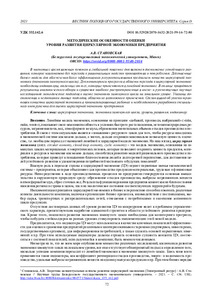Please use this identifier to cite or link to this item:
https://elib.psu.by/handle/123456789/28659Full metadata record
| DC Field | Value | Language |
|---|---|---|
| dc.contributor.author | Становская, А. В. | - |
| dc.contributor.author | Stanovskaya, A. | - |
| dc.date.accessioned | 2022-01-19T07:31:53Z | - |
| dc.date.available | 2022-01-19T07:31:53Z | - |
| dc.date.issued | 2021 | - |
| dc.identifier.citation | Становская, А. В. Методические особенности оценки уровня развития циркулярной экономики предприятия / А. В. Становская // Вестник Полоцкого государственного университета. Серия D, Экономические и юридические науки. - 2021. - № 14. - С. 72-80. | ru_RU |
| dc.identifier.issn | 2070-1632 | - |
| dc.identifier.uri | https://elib.psu.by/handle/123456789/28659 | - |
| dc.description.abstract | В настоящее время важным пунктом в глобальной повестке дня является достижение устойчивого развития, которое невозможно без перехода к рациональным моделям производства и потребления. Действенные бизнес-модели для обеспечения более эффективного ресурсопользования предлагает концепт циркулярной экономики (экономики замкнутого цикла). Для мониторинга прогресса в области перехода к циркулярной экономике необходимы индикаторы, отличные от тех, которые применяются в линейной экономике. В статье приводятся результаты аналитического обзора и сравнения наиболее распространенных в англо- и русскоязычных научных исследованиях методических подходов к оценке экономики замкнутого цикла на локальном уровне. Указаны достоинства и недостатки данных подходов, области их возможного применения. Сделан вывод об узости трактовки концепта циркулярной экономики в проанализированных работах и необходимости разработки специального инструмента для оценки циркулярной экономики предприятия.= Currently, an important item on the global agenda is the achievement of sustainable development, which is impossible without a transition to sustainable production and consumption patterns. Effective business models for ensuring more efficient resource use are offered by the concept of a circular economy (circular economy). Indicators other than those used in linear economics are needed to monitor progress in the transition to a circular economy. the article presents the results of an analytical review and comparison of the most common methodological approaches in English and Russian- speaking scientific research to assessing the circular economy at the local level. the advantages and disadvantages of these approaches, their areas of possible application are indicated. the conclusion is made about the narrowness of the interpretation of the concept of circular economy in the analyzed works and the need to develop a special tool for assessing the circular economy of an enterprise. | ru_RU |
| dc.language.iso | ru | ru_RU |
| dc.publisher | Полоцкий государственный университет | ru_RU |
| dc.relation.ispartof | Веснік Полацкага дзяржаўнага ўніверсітэта. Серыя D, Эканамічныя і юрыдычныя навукі | be_BE |
| dc.relation.ispartof | Herald of Polotsk State University. Series D, Economics and law sciences | en_EN |
| dc.relation.ispartof | Вестник Полоцкого государственного университета. Серия D, Экономические и юридические науки | ru_RU |
| dc.relation.ispartofseries | Серия D, Экономические и юридические науки;2021. - № 14 | - |
| dc.rights | open access | ru_RU |
| dc.title | Методические особенности оценки уровня развития циркулярной экономики предприятия | ru_RU |
| dc.title.alternative | Methodological Features of Assessment of the Level of Development of the Circular Economy of an Enterprise | ru_RU |
| dc.type | Article | ru_RU |
| dc.identifier.udc | 332.142.6 | - |
| dc.identifier.doi | 10.52928/2070-1632-2021-59-14-72-80 | - |
| Appears in Collections: | 2021, № 14 | |
Items in DSpace are protected by copyright, with all rights reserved, unless otherwise indicated.
